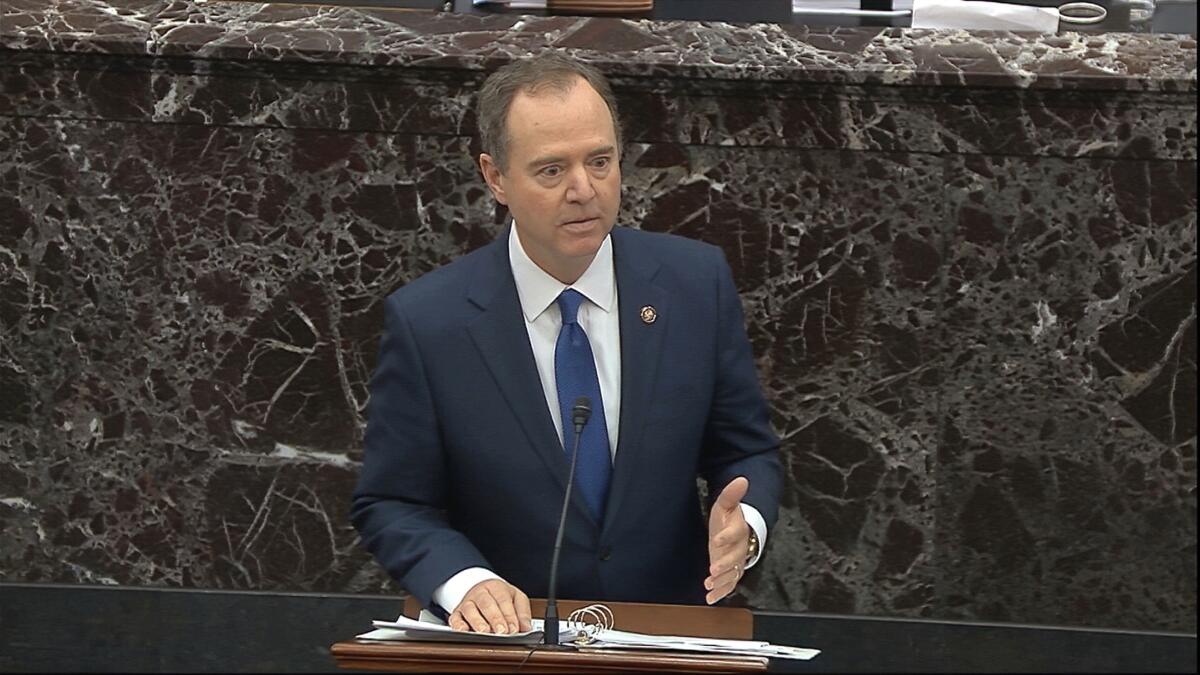‘Is there one among you who will say: “Enough”?’ Schiff asks GOP senators in final impeachment pitch

- Share via
WASHINGTON — President Trump’s lawyers and House impeachment managers issued their closing arguments Monday, with Democrats arguing the Senate has a “duty” to convict Trump and the president’s legal team saying senators would “vindicate” the right to vote by leaving the matter to voters in November.
With Trump’s acquittal all but assured on Wednesday, both parties did their best to limit defections from their side of the aisle and pick off votes from the other.
“Is there one among you who will say: ‘Enough’?” asked Rep. Adam B. Schiff (D-Burbank), the lead House manager, telling GOP senators that even a single vote for conviction from one of them would make an important statement.
He said anyone who doesn’t vote to convict Trump will see their name “tied to his with a cord of steel for all of history.”
“A man without character or ethical compass will never find his way,” Schiff said. “You are decent. He is not who you are.”
The House impeached the president in December for withholding military aid and a White House meeting from Ukraine while pressuring that country’s leadership to announce an investigation into former Vice President Joe Biden. No Republican supported impeachment in the House — and the White House is hoping that no Republican does so in the Senate, ensuring the effort will go down in history as one opposed by all Republicans.
Sen. Lisa Murkowski of Alaska, seen as one of the few Republicans who might break with her party, announced Monday evening she would not support removing Trump from office, though she called his actions “shameful and wrong.” She said Trump degraded the office of the presidency, but that ultimately the House inquiry and the Senate trial were so unfair, she could not vote to convict.
Trump’s lawyers reiterated that Trump didn’t do anything wrong and condemned the House for imposing a partisan impeachment on the country, playing a video of some House Democrats calling for impeachment shortly after the president was elected in 2016.
“The president has done nothing wrong and these types of impeachments must end,” said White House counsel Pat Cipollone. “You’ll vindicate the right to vote. You’ll vindicate the Constitution. You’ll vindicate the rule of law by rejecting these articles.”
Friday’s vote to block subpoenas for witnesses and documents was the most significant point of suspense in the two-week impeachment trial. Republicans blocked that motion, meaning there is nothing left to do but wind down the trial and hold the final vote on whether the president should be removed from office.
“Your duty demands that you convict President Trump,” Rep. Jason Crow (D-Colo.), another House manager, said. “Today you have a duty to perform with fidelity, not without a sense of surrounding dangers, but also not without hope.”
Trump’s lawyers narrowed in on the idea that the Senate should leave the decision of Trump’s fate to the voters, tapping into the conclusion reached by Sen. Lamar Alexander (R-Tenn.).
Alexander, who was considered a possible swing vote on the question of witnesses, said on “Meet the Press” on Sunday that Trump’s actions amounted to “crossing the line.” But he also said the conduct did not rise to the level of removing the president from office.
“Our founding documents provide for duly elected presidents who serve with ‘the consent of the governed,’ not at the pleasure of the United States Congress,” Alexander said in his statement Thursday. “Let the people decide.”
Following closing arguments Monday, senators began giving speeches on the Senate floor to explain their vote, a process that will continue for the next two days. The final vote on conviction or acquittal won’t take place until Wednesday afternoon.
The conclusion of the trial was delayed for the Iowa caucuses on Monday, the State of the Union on Tuesday and the fact that many senators want time to deliver a speech.
Democrats were cynical about the upcoming acquittal vote, echoing what House Speaker Nancy Pelosi (D-San Francisco) has been saying since the beginning of the impeachment inquiry: No one is above the law.
“On one level, I knew this would be the likely outcome,” Sen. Brian Schatz (D-Hawaii) said on the Senate floor. “On behalf of everyone who couldn’t get away with an unpaid traffic fine, is in jail for stealing groceries to eat, who can’t get a job because of medical debt — I say, shame on anyone who places this president, any president, above the law.”
One undecided Democrat, Sen. Joe Manchin III of West Virginia, proposed that the Senate censure Trump, a tactic attempted by Democrats during President Clinton’s impeachment. But Republicans have widely dismissed that idea.
“Censure would allow a bipartisan statement condemning his behavior in the strongest terms,” Manchin said.
Republicans were generally split on whether they believe Trump did nothing wrong or whether Trump’s actions in Ukraine were wrong but didn’t rise to the level of impeachment.
But several chastised the House for presenting a case that they said was flawed, including not subpoenaing witnesses such as former national security advisor John Bolton, who rebuffed a House request to testify but more recently said he would reply to a Senate subpoena.
“After nine days of presentation and questions, and after fully considering the record, I’m convinced that what the House is asking us to do is constitutionally flawed and dangerously unprecedented,” said Sen. Charles E. Grassley (R-Iowa).
Even as the trial was wrapping up in Washington, the first contest to determine who will run against Trump this fall was already underway. The four senators who are also running for the Democratic presidential nomination rushed from Iowa back to Washington for the closing arguments on Monday.
Sen. Amy Klobuchar (D-Minn.) admitted that she would have been crisscrossing the state over the last two weeks if she wasn’t sitting in the trial in Washington. She refused to say whether she thought it would have any effect on her placement in Iowa.
“Obviously, the last week I would have been the [candidate] that would have been on some crazy schedule to every small town in Iowa. And I couldn’t do that. But we’ll let the chips fall where they may,” she said.
The Constitution requires 67 votes to convict the president and remove him from office — a high bar considering there are 53 Republicans in the Senate. It remains unclear whether any Democrats will break ranks to vote for acquittal or any Republicans will vote for conviction.
Sen. Doug Jones (D-Ala.), a Democrat representing a state where Trump won substantially in 2016 and one of those remaining swing votes, said he’s still undecided.
“I’m getting there. I’m going through all of my notes. I’m going through everything,” he said. “I really do want to hear arguments and conversations from colleagues.”
Times staff writers Sarah D. Wire and Erin B. Logan contributed to this report.
More to Read
Get the L.A. Times Politics newsletter
Deeply reported insights into legislation, politics and policy from Sacramento, Washington and beyond. In your inbox twice per week.
You may occasionally receive promotional content from the Los Angeles Times.











